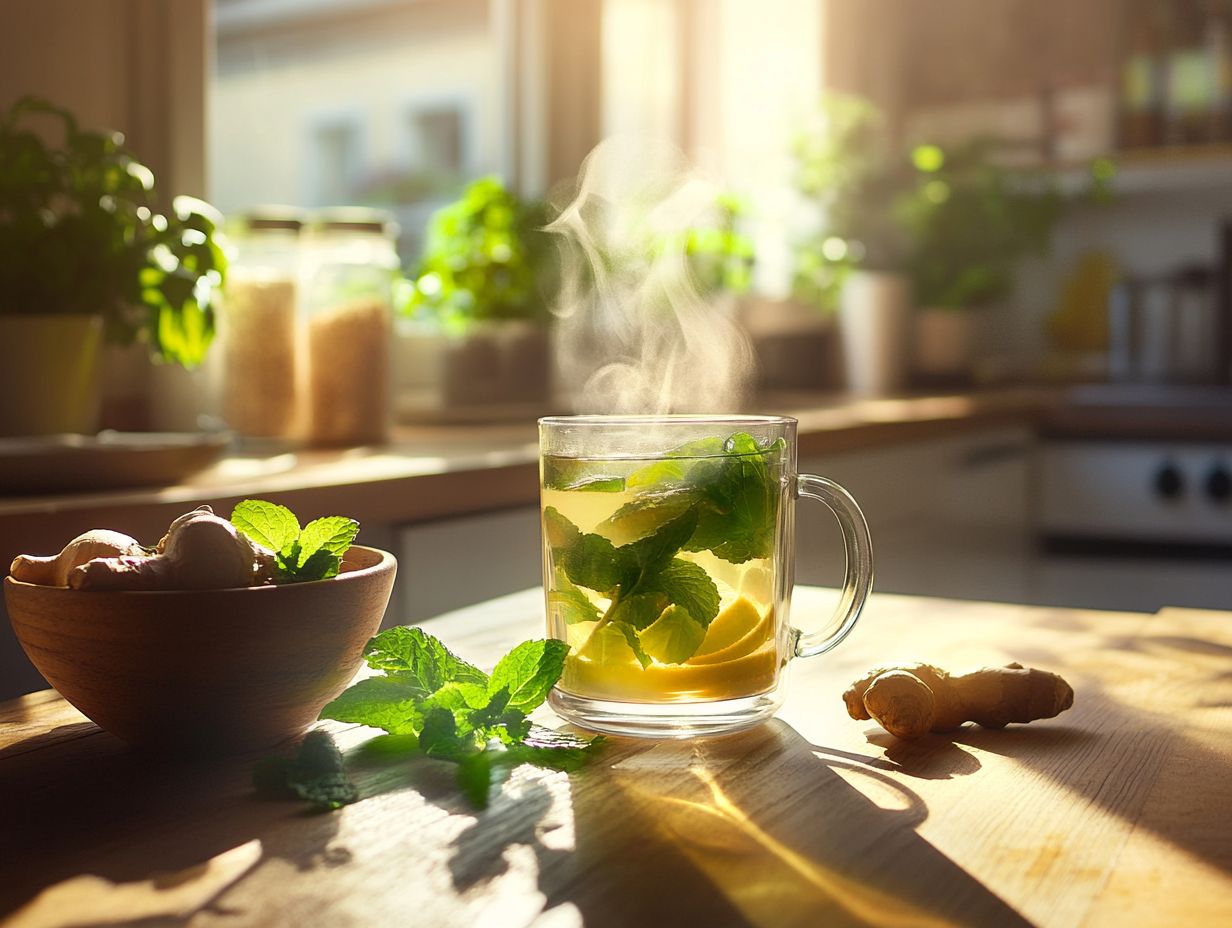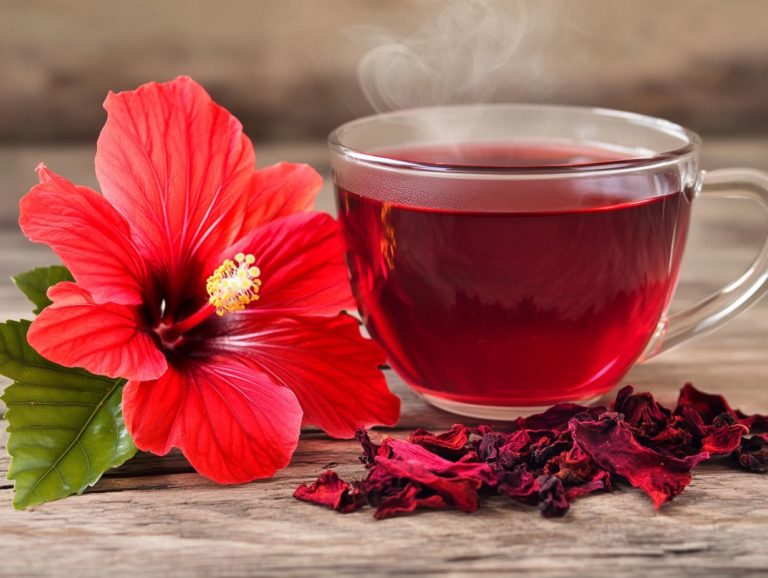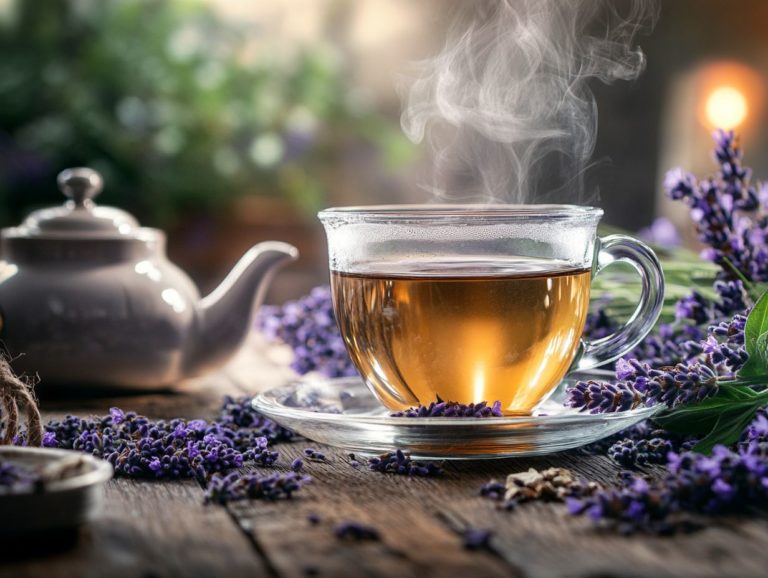Herbal Teas: Benefits for Healthy Digestion
The digestive system is essential to your overall health, impacting everything from nutrient absorption to immune function. As you search for natural ways to support this vital process, herbal teas, like peppermint tea and ginger tea, present themselves as both a delightful and beneficial choice.
Let s explore how you can boost your digestion with herbal teas! This article showcases a variety of herbal teas that promote gut health and provides practical guidance on selecting, brewing, and seamlessly integrating these soothing beverages into your daily routine.
Discover how a simple cup of herbal tea can elevate your digestive wellness. Don’t wait! Discover the soothing benefits of herbal teas today!
Contents
- Key Takeaways:
- The Digestive System and Its Importance
- Benefits of Herbal Teas for Digestion
- How to Choose the Right Herbal Tea for Digestion
- Tips for Brewing and Drinking Herbal Teas
- Possible Side Effects and Precautions
- Incorporating Herbal Teas into a Healthy Diet
- Frequently Asked Questions
- What are herbal teas and how do they benefit healthy digestion?
- Which herbs are known to be beneficial for digestion?
- Can herbal teas help with common digestive issues?
- Are herbal teas safe for everyone to drink?
- How often should I drink herbal teas for optimal digestive health?
- Can children and pregnant women drink herbal teas for digestion?
Key Takeaways:

- Herbal teas aid in digestion by stimulating the digestive process and soothing any discomfort in the digestive system.
- Different types of herbal teas have unique benefits for digestion, such as reducing bloating or relieving constipation. Choose the right one for your specific needs.
- Consider allergies and health conditions when adding herbal teas to your diet. Proper brewing techniques are essential to ensure maximum benefits and avoid any potential side effects.
The Digestive System and Its Importance
The digestive system is vital to your overall health. It breaks down food, absorbs essential nutrients, and eliminates waste. This underscores the importance of maintaining digestive health.
When digestion functions properly, it helps prevent various issues, such as irritable bowel syndrome and constipation. These conditions can profoundly impact your quality of life. By understanding the functions and significance of the digestive tract, you empower yourself to make informed decisions about your diet and lifestyle, ultimately enhancing your well-being and promoting longevity.
Understanding the Digestive Process
Understanding the digestive process is essential for recognizing how your body breaks down food and absorbs vital nutrients for optimal health.
From the moment food enters your mouth, a series of intricate stages unfold that significantly impact your overall well-being. The journey begins with eating, where your chewing mechanically breaks down the food and mixes it with saliva that contains enzymes for that all-important initial digestion.
As the food moves to your stomach, it undergoes further digestion, where the acidic environment works diligently to eliminate harmful bacteria. This stage plays a crucial role in your digestive health; any imbalances here could lead to unwelcome issues like acid reflux or ulcers.
Next, in the small intestine, your body absorbs nutrients through the intestinal walls. This essential process provides energy and sustains bodily functions. Every phase, from eating to absorption, serves a distinct purpose in promoting digestive efficiency and health.
This emphasizes the importance of maintaining a balanced diet rich in fiber and healthy bacteria, helping you prevent common digestion troubles and improve digestion.
Benefits of Herbal Teas for Digestion
Herbal teas are renowned for their potential digestive benefits. They serve as a natural remedy for a range of digestive issues while promoting overall digestive health.
Beverages such as peppermint tea, ginger tea, chamomile tea, fennel tea, and dandelion root tea are frequently recommended for their soothing properties and effectiveness in enhancing digestion. For those looking for additional options, consider 5 herbs that support healthy digestion. These teas are a popular choice for anyone seeking relief from discomfort in the digestive tract.
Types of Herbal Teas and Their Benefits
Herbal teas, such as peppermint tea, ginger tea, chamomile tea, fennel tea, and dandelion root tea, offer unique digestive benefits tailored to specific concerns.
Peppermint tea is known for easing bloating and gas due to its menthol content, which relaxes the muscles in your gastrointestinal tract. Ginger tea is also recognized for its anti-inflammatory properties, making it a great remedy for nausea and other digestive disturbances. Chamomile tea not only helps reduce stress but also provides a soothing effect on your stomach, enhancing overall digestive comfort.
Fennel tea is a natural remedy that helps relieve gas and digestive cramps. Dandelion root tea supports liver health and stimulates appetite.
Research shows that these herbal infusions can significantly boost digestion, making them essential allies on your journey towards a healthier lifestyle.
How to Choose the Right Herbal Tea for Digestion

Choosing the right herbal tea can transform your digestive health and provide calming benefits.
Factors to Consider
When selecting herbal teas for digestion, consider your individual digestive health and any specific issues you may face. It’s also important to be aware of the safety standards associated with herbal remedies.
Your personal health conditions play a vital role in making informed decisions. If you have allergies to certain plants, avoid herbal options with those ingredients. Taste preferences matter too; enjoying the flavor can greatly enhance your overall experience.
Opt for herbal teas with scientific evidence backing their effectiveness, ensuring what you consume meets established safety standards and regulations.
Making informed choices leads to a more beneficial and enjoyable journey toward better digestive health.
Tips for Brewing and Drinking Herbal Teas
Brewing and enjoying herbal teas correctly is crucial for unlocking their full health benefits, especially those that promote digestion.
Proper Techniques and Dosage
Understanding the proper brewing techniques can significantly enhance digestive aids like peppermint oil and ginger tea.
Employing the right steeping times and temperatures unlocks the full medicinal properties of these herbs. For example, peppermint tea should steep for about 5 to 7 minutes in water heated to around 200 F to fully extract its essential oils.
Ginger tea benefits from a longer steep of about 10 minutes at a lower temperature (around 190 F), which helps release its powerful anti-inflammatory compounds. Using about 1 teaspoon of dried ginger root or a small piece of fresh ginger in 8 ounces of boiling water optimizes its effects.
By following these brewing guidelines, you ensure a flavorful cup while maximizing the digestive benefits.
Possible Side Effects and Precautions
While herbal teas offer remarkable benefits for digestive health, it s essential to remain mindful of potential side effects and exercise caution, especially with popular options like peppermint tea and ginger tea.
Don’t miss out on the incredible benefits of herbal teas! Be sure to consult a healthcare provider for personalized advice on your digestive health.
When to Avoid Herbal Teas for Digestion

In specific situations, it may be wise to steer clear of herbal teas for digestion to prioritize your safety and prevent any adverse effects, especially if you have existing digestive concerns.
If you have gastrointestinal disorders like irritable bowel syndrome (IBS) or gastroesophageal reflux disease (GERD), exercise caution. Certain herbal ingredients might aggravate your symptoms. Pregnant or breastfeeding individuals should also be vigilant, as some herbs can affect hormones or influence milk production.
If you take prescribed medications especially blood thinners or antidepressants be aware of possible interactions that could make herbal teas unsafe.
Consider these factors and check safety guidelines from health authorities, given that research presents varying scientific evidence regarding the efficacy and risks associated with herbal remedies.
Incorporating Herbal Teas into a Healthy Diet
Incorporating herbal teas into your daily diet can truly elevate your digestive health and help manage any digestion issues.
These delightful brews not only provide enjoyment but also come with a wealth of wellness benefits.
Ways to Include Herbal Teas in Your Daily Routine
There are countless ways to incorporate herbal teas into your daily routine, effortlessly reaping the digestive health benefits of delightful options like peppermint tea and ginger tea, along with soothing choices like chamomile.
Imagine starting your day with a refreshing cup of herbal tea that sets a positive tone, invigorating your senses while providing gentle support for digestion and enhancing your overall digestive health.
At lunchtime, why not swap your usual drink for soothing chamomile tea? It not only aids digestion but also envelops you in a calming embrace.
As the day winds down, a warm cup of fennel tea can become a delightful post-dinner ritual, helping to ease bloating and paving the way for a restful night s sleep.
By seamlessly weaving these herbal infusions into your mealtimes, you can savor rich flavors while enjoying significant health benefits, creating a holistic approach to your well-being.
Frequently Asked Questions
Here are some common questions about herbal teas and digestion.
What are herbal teas and how do they benefit healthy digestion?
Herbal teas are beverages made from dried herbs, fruits, and flowers steeped in hot water. They provide numerous health benefits, including aiding digestion by promoting the release of digestive enzymes and reducing inflammation in the digestive tract.
Which herbs are known to be beneficial for digestion?

Some of the most commonly used herbs in herbal teas for digestion include peppermint, ginger, chamomile, fennel, and dandelion. These herbs have anti-inflammatory, antioxidant, and antispasmodic properties that can help soothe and regulate the digestive system.
Can herbal teas help with common digestive issues?
Yes, herbal teas can help with various digestive issues such as bloating, gas, indigestion, and constipation. Peppermint tea can relieve cramping and bloating, ginger tea can soothe nausea and aid digestion, and chamomile tea can calm an upset stomach. Always consult with a healthcare professional for individualized treatment recommendations.
Are herbal teas safe for everyone to drink?
In general, herbal teas are safe for most people to drink. However, some herbs may interact with certain medications or have adverse effects for those with specific medical conditions. It’s always best to consult with a healthcare professional before incorporating herbal teas into your diet.
How often should I drink herbal teas for optimal digestive health?
It is recommended to drink herbal teas for digestive health as needed. If you experience frequent digestive issues, incorporating herbal teas into your daily routine may be beneficial. However, moderation is key, and it is important to listen to your body’s needs and adjust accordingly.
Can children and pregnant women drink herbal teas for digestion?
Children and pregnant women must talk to a doctor or medical expert before trying herbal teas.
Some herbs can be harmful, so it s crucial to check what s safe for them.






